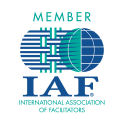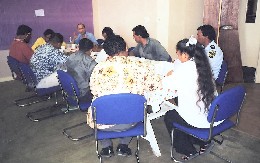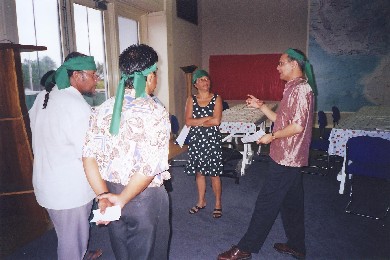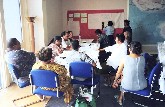FACILITATING AND LEADING IN GROUPS



Facilitating and leading can be closely related activities;
both are focused on bringing out the best in people through human interaction.
From one-on-one exchanges to large group interactions,
the principles and the dynamics remain the same.
The power of facilitating and leading in groups
All organisations, teams, small groups and large groups (and also many individuals) are challenged by complex factors in communicating, planning, making decisions, managing projects and moving forward together.
No matter what the size of a group, they will struggle on occasion to make and take the time, to define and maintain the focus, and to design and adapt the structures required, for constructive and practical outcomes with enduring relationships.
The facilitative leader is becoming an increasingly valuable resource:
With effective design and leadership, people can actually start to look forward to having a meeting or workshop, being more willing and able to prepare, contribute, participate and follow through.
- for helping people explore issues which confront an organisation or group
- for tapping the breadth of ideas and the depth of understandings; and
- for building greater shared awareness, purpose and commitment.
Who is it for?
Facilitating & Leading in Groups is a facilitated learning package which can be tailored to client needs.
It is for anyone wishing to improve the effectivess of their communication and interaction with others:
- with application from one-on-one contact to large group processes, for any conversation that matters
- not just people who stand up in front of a group as the obvious leader of a discussion or workshop, but also those who are happy to help a group from within the group
- not just in big rooms with whiteboards, but also over coffee tables, on telephones, and in the great outdoors
- not just dealing with events while they are happening, but also designing interactions to maximise the chances of successful outcomes.
How is it delivered?
The core of the package includes:
- a total of six days of face-to-face interactive delivery
- pre-consultation for in-house sessions to enhance tailoring of content and resources to participants' needs
- a comprehensive resource pack; and
- coaching and mentoring between sessions to enhance application of learning.
- Pre-session
engagement and preparation (face-to-face or distance) through which
participants develop case study material to support learning
during the session
- An
additional recall day (or days) focused on grounding learning through
case study analysis,
scenarios and role plays
- An
additional recall day (or days) tailored to specified applications of
new skills e.g. design thinking; business model generation; program
logic; performance
story reporting; cross-cultural communication in Australian Indigenous
or Māori culture; project management; balanced scorecard/strategic
alignment
(these can be integrated with the grounding session above)
- A follow-up advanced session of one to two days after 3 to 6 months for deepening learning and reinforcing application
Download a brochure about Facilitating & Leading in Groups -
 pdf
pdf Facilitating & Leading in Groups is one of the components of the comprehensive development program:
Out in Front: The Way of the Facilitative Leader™, presented by Futures by Design™. Download a brochure -
 pdf
pdf To find out about upcoming courses, or to explore possibilities in your area or organisation, please email.
Clients of our training are eligible to receive discounts on facilitation and consultancy services from
Futures by Design™.
OBJECTIVES/LEARNING OUTCOMES
As a result of attending these practical skill sets, each participant will have developed:
New capacitiesPractical application
- new insights and perspectives on communication and the underlying dynamics of human processes
- new skills and tools to explore awareness and understanding, tap into creativity, build cooperative relationships, and develop agreement and commitment
Strengthened engagement and relationships
- the ability to apply new learning, as a leader/facilitator of process, or as a participant in process,
from one-to-one interactions to larger groups- a plan for real-life application of key methods and understandings, and for continued coaching or mentoring
- enhanced confidence to engage with diverse parties and complex situations to build towards creative and constructive outcomes
- strengthened relationships with peers, colleagues and others through sharing of practical experience and engagement in exercises which assist participants to become a resource to each other.

CORE STRUCTURE
The customary delivery is in two sessions of three days, with six to eight weeks intervening, during which participants undertake to practice the skills and methods they have learned in the first session.
The learning can also be delivered in three sessions of two days.
Some components can be offered in a cumulative sequence of one day sessions, with adjustments.
SESSION 1:
SOLID FOUNDATIONS
SESSION 2:
BROADER - DEEPER - STRONGER
DAY 1
DAY 4
Essential participatory process
Dynamics of humans in process
Conversations that matter (ORID)
Questions that work
Scanning contexts - diagnosing needs
Understanding history and environment
Some variations in gathering data
DAY 2
DAY 5
Workshops
Levels of agreement
Some variations in processing data
Some variations in Workshops
Strategic Thinking-Action-Review (f-STAR™)DAY 3
DAY 6
Action Planning
Designing and staging effective events
Real-life applications
Strategic Thinking-Action-Review (f-STAR™)
[continued]
Real-life applications
- Practice in real-life application
- Coaching and Mentoring
- Continued real-life application
- Coaching & Mentoring
LEARNING EXPERIENCE
The learning experience includes:
Experiential and adult learning principles support the learning and application of tools and techniques by grounding these in actual work projects of participants. This builds competence and confidence in the continued use of facilitation methods and deepens understanding of the profound role of facilitation in leading change.
- demonstration and unpacking of skills and techniques
- individual and team/group practice and reflection
- giving and receiving feedback
- developing a personal and/or team plan for real-life application
- coaching and mentoring of individual facilitation in practice (action learning)
At the end of the training each participant will have a statement of attendance, a comprehensive set of course notes, worked examples, and proposals for application and practice of their learnings in real-life situations.
They will also have access to mentoring from highly experienced facilitators.
To find out about upcoming courses, or to explore possibilities in your area or organisation, please email.



CONTENT METHODOLOGIES
Material addressed or presented in the training is drawn or adapted from many sources, including:
Material addressed or presented in the training is drawn or adapted from many sources, including:
- the Technology of Participation™ (ToP™)
- improvisation
- narrative technique, story telling, metaphor
- strengths-based and appreciative approaches
- force field analysis
- nominal group method
- search conferences
- marketplaces, cafes, Open Space
- Neuro-Linguistic Programming (NLP)
- non-violent communication
- strategic questionning
- other established and emerging developments in facilitation and communication practice (including work by Stephen R Covey, Edward De Bono); and
- a wide range of practical models of human behaviour, communication, group dynamics and learning, to deepen understanding, assist in diagnosis and design, and encourage application
Actual material addressed in any
event will vary in response to the
needs and expressed interests of participants.
The leaders are authorised to deliver Technology of Participation (ToP) content.
Participants who complete the practical skill sets may be eligible to receive a certificate of attendance at ToP Facilitative Leadership Program Module 1 Group Facilitation Methods, Module 2 Facilitation & Expansion and Module 3 Strategic Thinking & Planning.
See also Training in facilitation, communication, leadership, influencing and negotiating offered by Mark Butz of Futures by DesignTM.
Clients of our training are eligible to receive discounts on facilitation and consultancy services from Futures by DesignTM.
SAMPLE FEEDBACK ON TRAINING LED BY MARK BUTZ
See Testimonials on Practice for participant feedback
The leaders are authorised to deliver Technology of Participation (ToP) content.
Participants who complete the practical skill sets may be eligible to receive a certificate of attendance at ToP Facilitative Leadership Program Module 1 Group Facilitation Methods, Module 2 Facilitation & Expansion and Module 3 Strategic Thinking & Planning.
Completion of
the ToP Facilitative Leadership Program is a requirement for
being assessed as a Certified
ToP Facilitator.
See also Training in facilitation, communication, leadership, influencing and negotiating offered by Mark Butz of Futures by DesignTM.
Clients of our training are eligible to receive discounts on facilitation and consultancy services from Futures by DesignTM.
SAMPLE FEEDBACK ON TRAINING LED BY MARK BUTZ
See Testimonials on Practice for participant feedback
See also our pages for:
Facilitation Fundamentals
Relating, Influencing & Negotiating
Embracing Diversity, Uncertainty & Change
Staying on Track Link coming soon
Finding Your Voice, Hearing Others Link coming soon
Bringing The Real You to All You Do Link coming soon
Learning to Learn Link coming soon
Breaking New Ground Link coming soon
Adapting, Surviving and Thriving Link coming soon
Being a Facilitative Leader
Relating, Influencing & Negotiating
Embracing Diversity, Uncertainty & Change
Staying on Track Link coming soon
Finding Your Voice, Hearing Others Link coming soon
Bringing The Real You to All You Do Link coming soon
Learning to Learn Link coming soon
Breaking New Ground Link coming soon
Adapting, Surviving and Thriving Link coming soon
Being a Facilitative Leader
Information submitted to us will not be provided to a third party without the permission of the supplier. |
HTML and Images © 2005-2021 Mark Butz
Out in Front™; The Way of the Facilitative Leader™; f-STAR™; Futures by Design™ are the property of Mark Butz
Technology of Participation™; ToP™; Facilitative Leadership Program™; Certified ToP Facilitator™; and CToPF are the property of the Institute of Cultural Affairs (ICA)
Last update 6 August 2021
Disclaimer